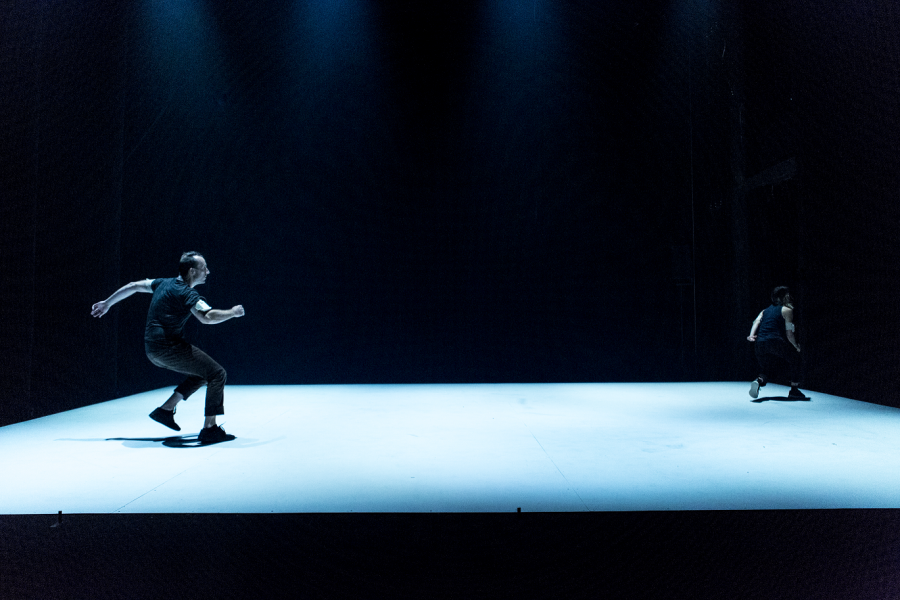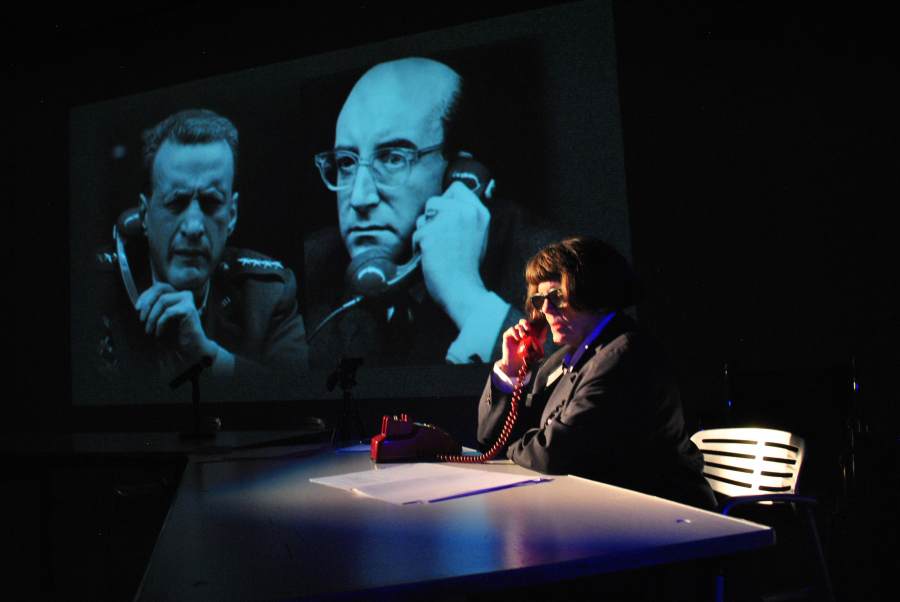

In case you’ve ever wondered what it would be like to die from hypothermia or in a nuclear attack, two shows at the Under the Radar Festival might have some insight for you. In After, tech wiz Andrew Schneider focuses on that moment seconds before dying when your entire life, allegedly, flashes in front of your eyes like the most intimate of films. Through a series of vignettes focused on trying to convey sensorial deprivation and what it might feel like to “fade out,” Schneider aims to make sense of a person’s final moments, to prepare us? Shock us? Perhaps a little of both.
Meanwhile in Unexploded Ordnances (UXO), queer comedic icons Split Britches, pay homage to Stanley Kubrick’s Dr. Strangelove: Or How I Learned to Stop Worrying and Love the Bomb in a performance that takes place in the hour before we’re hit by nuclear missiles sent by a madman. Peggy Shaw plays the obtuse, ill tempered General played by George C. Scott in the movie, while Lois Weaver plays the President played by Peter Sellers, although her whimsical performance also has traces of James Stewart and Charlie Chaplin.
Mortality is at the center of both shows, but like in life, they remind us that even if we’re all promised death, we have a say in how we spend the time before it arrives. After focuses on loss and missed opportunity, as Schneider and his collaborators (including Alicia ayo Ohs with whom he spends most time onstage) attempt to do a “greatest hits of life” in tightly choreographed sequences that include ruminations on the afterlife, and moments that seem inconsequential but on a larger scale are meant to remind us that living is a succession of innocuous bits that accumulate to form our legacy.
The show is nothing if not spectacular, with Schneider using a myriad of tech resources to execute interpretations of his knowledge of cerebral functions and sensorial acts. If your brain was a Siri, there are moments during the show when you’d stop to ask “how did they pull that off?” But it’s precisely in this tightness and obsession with control that the show finds its biggest weakness: it’s completely humorless. It’s an academic interpretation of living rather than a poetic take on it.

If After is an autopsy, Unexploded Ordnances is the most joyful of wakes, a celebration of the precious time we’re given on Earth, and an appeal for us to be better. The show departs the Strangelove tradition by having the president fill her council of advisors not with joyless, neurotic politicians, but Elders convoked from the audience. The final countdown to doom (we’re asked to set our phone timers to 59 minutes at the top of the performance) is then filled not with dourness but with conversation about how we can improve our surroundings and make life better. At the performance I attended some of the Elders included an interracial lesbian couple who’d met decades before while vacationing in Mexico, a pair of siblings who’d been around during the Korean War, and an outspoken woman who expressed how much she wanted to make love to Dwayne “The Rock” Johnson.
At first it’s as if we’re meant to think that Unexploded Ordnances will result in nothing but a series of complaints (rightful and self-centered in equal measures) but instead what we see is Split Britches reclaiming the stage as a public forum. When the Elders come up with funny bits, we don’t laugh at them, but with them. If misery loves company, is it perhaps because hope can arise from communion?
The amount of control we exert in our existence is a big preoccupation for many of us, and it’s also at the center of these two shows, which for better or worse represent two very different worldviews. One is all about taking control of our destiny, the other about squeezing those proverbial lemons into the sweetest lemonade we’ve tasted. It’s impossible not to think about the shows together and avoid thinking what they could provide each other. It’s no surprise for instance, that the moments that feel more alive in After are those where things go out of control, like a scene-stealing plastic bag that “chose” to linger and get a louder audience reaction, or the man who shouted “I can’t see anything” when everything went pitch black on purpose.
For those with A-type personalities, Unexploded Ordnances might be a bit too aimless, its meandering become exasperating. The countdown doesn’t help those with anxiety issues either, not everyone wants to be so hyper aware of time. But at the end of the day, both pieces remind us that a lot of what goes into life is who we choose to spend it with, and I simply can’t think of a better place to await the end of the world than with Split Britches.